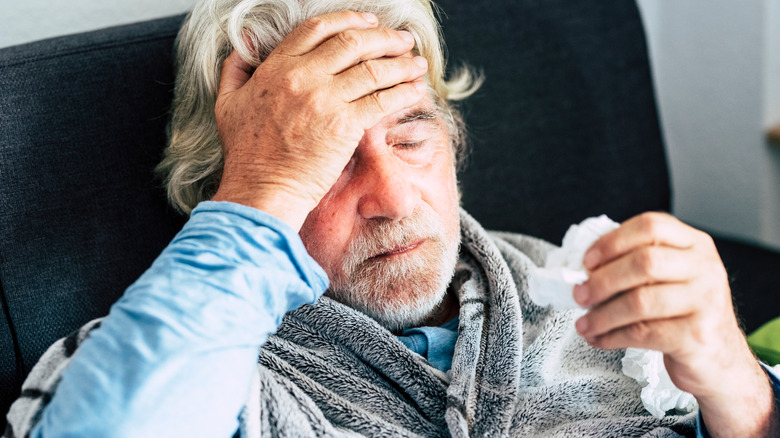What Happens To Our Sense Of Smell As We Age?
The olfactory system is pretty incredible and is responsible for our ability to smell. The olfactory nerve is at the heart of this system and ends at a bundle of receptors located in the upper portion of the nasal cavity. The olfactory nerve is part of the autonomic nervous system, and it conveys different smells by detecting the different molecules that certain substances release (via Cleveland Clinic). Live Science reports that our noses can identify 10,000 different kinds of scents, and strangely, not everyone smells everything the same way. Your nasal cavity also contains tiny hairs and cells that help your nose identify odors (via Cleveland Clinic).
Our senses of smell and taste are connected. In fact, our noses give our brains information about how things taste, per Scientific American. While there may be tens of thousands of smells, there are only five tastes: sweet, sour, bitter, salty, and umami, which detects monosodium glutamate (MSG). But what happens to our sense of smell (and taste) as we age?
Our sense of smell diminishes as we get older
All of our senses become less effective with age, according to MedlinePlus. Most people can expect their sense of smell to become weaker after turning 70. Harvard Health reports that one out of every eight people between the ages of 53 and 91 will experience some loss of smell.
Several factors can contribute to a loss of smell as we age. Certain medications and vitamin deficiencies can affect how things smell, per the American Association of Retired Persons (AARP). Medical conditions, such as nasal polyps, allergies, and chronic sinus infections, can also weaken our sense of smell. One of the reasons that our noses stop smelling is because we lose receptor cells with age. According to Scientific American, we are born with about 10 million olfactory receptors, and that can drop by two-thirds with age. Oddly enough, most of the population loses more of their sense of smell than they do their sense of taste.
Consequences and treatments
Since our sense of taste and smell are inextricably linked, one of the main consequences of diminished smell is a lack of taste. When we can't taste foods, we could become less likely to eat, and over an extended period of time, this could lead to nutritional deficiencies. But difficulty tasting food is just one consequence of not being able to smell. When our nose doesn't work as well as it should, we may not be able to smell bad food, a fire, or a gas leak (via AARP).
Some decline in your sense of smell can't be avoided, but there are some things you can do to help keep your nose in tip-top shape. AARP recommends avoiding exposure to cigarette smoke, air pollution, and harsh chemicals. You can also practice smelling exercises to help keep your sense of smell sharp. To do this, take a few deep breaths of your favorite candle, essential oil, or another scent you enjoy for a few minutes twice a day. You should always consult your doctor if your sense of smell changes drastically or if you smell bad odors with no apparent cause, per the Cleveland Clinic.



